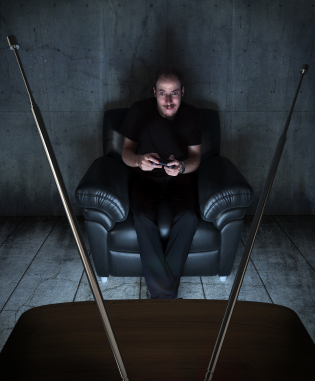“Do not fall prey to the false belief that mastery and domination are synonymous with manliness.”
– Kent Nerburn
I volunteered to help out at my daughter’s musical production of “The Wizard of Oz” a few weekends ago. When I walked into the workshop, I already knew I was in trouble. The place looked like something out of This Old House. Wood, nails, and power tools were on the floor. Guys with tool belts, safety goggles, and tape measures were walking around pounding and sawing. Let me be perfectly clear – this is not my element. I have trouble putting together Ikea furniture. When there’s a problem with the sink or when the power goes out…I call my wife. In short, I am no handyman.
The head builder/volunteer/foreman must have assumed that I had some kind of skill because he started asking me to grab a 3/8th something or other and cut a 45-degree blah-blah using an electric thingamajig. When he told me to pick up a power saw and start cutting, I had to come clean about not understanding a word he was saying. I envisioned cutting off my hand and spewing blood all over the Emerald City. I asked if I could just paint or nail something. All at one time I felt embarassed and un-manly.
Whenever I read a men’s magazine, a list of “Things a Man Should Know” inevitibly shows up. It usually includes things like:
Have basic construction/handyman skills
We’ve all envied other people for possessing skills that we lack. Sometimes I wish I could easily build or fix things around the house, be more comfortable in social situations, or know how to build a slick-looking Excel spreadsheet. When I was younger, my lack of certain skills bothered me, but as I’ve grown older, I’ve come to appreciate the skills and gifts I do possess. So the next time you feel un-manly or envious of someone else, keep these things in mind:
Accept that everyone has their own unique gifts and talents: We were created to be unique individuals, each with our own strengths (and weaknesses). Everyone has something to offer – including you – even if you don’t think so.
Use what you have: OK, so I couldn’t saw wood using a table saw. So what? I could still paint, hammer and drill. I wasn’t completely useless. Find what you can do and do that. Every little bit helps.
Acknowledge and appreciate your gifts: Never take your skills for granted, and more than that, don’t belittle them. I appreciate the things I can do well, knowing they’ve gotten me to where I am today. You may not be able to create a spreadsheet, but people come to you when they need a report edited or something written. You aren’t the best athlete, but other athletes come to you for advice on nutrition or exercise regimen. Love your gifts and maximize them.
Learn it: Just because you’re weak at something doesn’t mean you can’t get better at it. With the internet, “how to” do anything is pretty much at your fingertips. Go to the library, have a friend teach you, loiter at your local bookstore. If I really wanted to, I could probably learn what a 3/8th something or other is and how not to cut my hand off using a power saw.
Most of all, know that there’s probably someone out there who envies and respects your abilities and the things that you do well. Keep that in mind the next time your ego tells you to grab the power saw when you have absolutely no clue about what you’re doing. You may feel temporarily un-manly, but at least you’ll still have both hands and all of your fingers.










